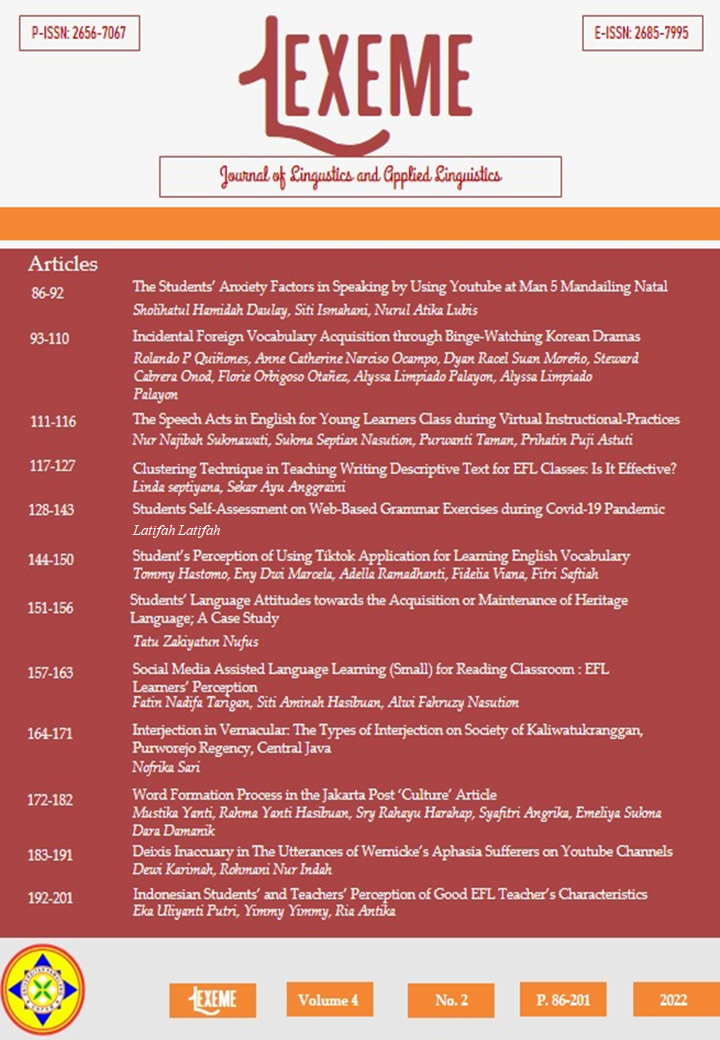THE STUDENTS’ ANXIETY FACTORS IN SPEAKING BY USING YOUTUBE AT MAN 5 MANDAILING NATAL
DOI:
https://doi.org/10.32493/ljlal.v4i2.18935Keywords:
Student’s anxiety, speaking, English, YouTubeAbstract
The purpose of this study was to explore a variety of types of Students Anxiety in Speaking English in the tenth grade of MAN 5 Mandailing Natal, as well as the factors that contributed to the Student's anxiety in speaking English in the tenth grade of MAN 5 Mandailing Natal by using youtube. The objection is the first year of the 2020/2021 school year. This method was a qualitative study that used observations and interviews to collect data. the data analysis in this study was descriptive analysis, data reduction, data display, conclusion, or verification. Based on the research it found that there were three types of student anxiety in learning English at the tenth-grade of MAN 5 Mandailing Natal, they are State anxiety, where the students feel panic and could stress when they want to speak in English, trait anxiety, where the students feel nervous when the students could not understand the teacher explanation, and specific-situation Anxiety, where the students should do examination about speaking. three factors caused the student's anxiety in learning English in the tenth grade of MAN 5 Mandailing Natal. these factors are communication apprehension, where the students could not speak English because they have little experience with English and do not always practice English, test anxiety, where the students feel anxious because they have to do the test that the teacher gives them, and fear of negative evaluation when students afraid about others people comment to them.References
Adawiyah, R, Daulay, S. H. (2021) The Differences Of Bilingual And Monolingual Communication Competences in Adolescents. Lexeme: Journal of Linguistics and Applied Linguistics. Vol. 3 No. 2, 2021. doi: 10.32493/ljlal.v3i2.18722
http://openjournal.unpam.ac.id/index.php/LJLAL/article/view/18722/9611
Bungin, B. (2007). Penelitian Kualitatif: Edisi Kedua. Jakarta: Kencana Prenada Media Group.
Daulay, S. H. (2019). Language and Society. Medan: Lembaga Peduli Pengembangan Pendidikan
Daulay, SH., Lubis, Y., Damanik, ESD., Wandini, RR., Putri, FA., (2021). Does Pictionary Game Effective for Students’ Speaking Skill?. JELTL (Journal of English Language Teaching and Linguistics). Yayasan Visi Intan Permata Samarinda. Vol. 6(1). (13-25) http://jeltl.org/index.php/jeltl/article/view/486/pdf
Departemen Pendidikan Nasional. (2003). Undang-Undang Republik Indonesia No. 20 Tentang Sistem Pendidikan Nasional. Jakarta: Departemen Pendidikan Nasional Republik Indonesia.
Ellis, R. (1994). The Study of Second Language Acquisition. England: Oxford University Press.
Harmer, J. (2004). The Practice of English Language Teaching (6th ed.). 38.
Horwitz, E. K. and Dolly, J. Young. (2011). Language Anxiety: From Theory and Research to Classroom Implication. New Jersey: Prentice-Hall Inc.
M.Tanveer. (2007). Investigation of the Factors that cause Language Anxiety for ESL/ELF Learners in Learning Speaking Skills and the Influence it Casts on Communication in the Target Language. England: University of Glasgow.
Moleong, L. (2014). Metodologi Penelitian Kualitative. Jakarta: Remaja Rosda Karya.
Ormrod, J. E. (2011). Educational Psychology: Developing Learner. Boston: Pearson Education Inc.
Paramasivam, S. (2013). The anxiety of Speaking English in Class Among International Students in a Malaysian University. International Journal of Education and Research, 1.
Passer, Michael W., and Ronald E., Smith. (2009). Psychology: The Science of Mind and Behavior. New York: McGraw-Hill.
Prakoso, Kukuh. (2009.) Lebih Kreatif Dengan Youtube. Yogyakarta : Andi Ofset
Sanaki, A. H. (2009). Media Pembelajaran. Yogyakarta: Safiria Insania Press.
Sarwono, J. (2006). Metode Penelitian Kualitatif & Kualitatif. Yogyakarta: Graha Ilmu.
Sugiyono. (2012). Metode Penelitian Pendidikan, Pendekatan kualitatif, dan R&D. Bandung: Alfabeta.
Tercan, G.and Dikilitas. (2015). EFL students’ speaking anxiety: a case from. ELT Research Journal, 16-17.
Richard P. Halgin and Susan Krauss Whitbourne. (2007). Abnormal Psychology: Clinical Perspectives on Psychological Disorder. New York: Mc Graw-Hill.







